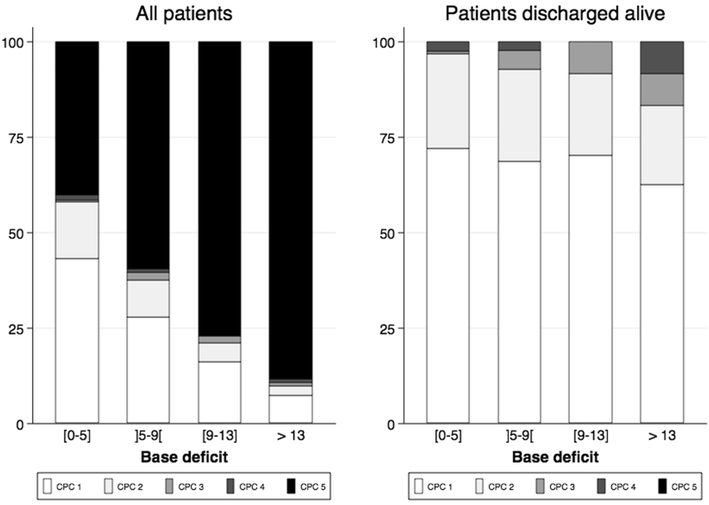Severe metabolic acidosis after out-of-hospital cardiac arrest: risk factors and association with outcome
- PMID: 29740777
- PMCID: PMC5940999
- DOI: 10.1186/s13613-018-0409-3
Severe metabolic acidosis after out-of-hospital cardiac arrest: risk factors and association with outcome
Abstract
Background: Metabolic acidosis is frequently observed as a consequence of global ischemia-reperfusion after out-of-hospital cardiac arrest (OHCA). We aimed to identify risk factors and assess the impact of metabolic acidosis on outcome after OHCA.
Methods: We included all consecutive OHCA patients admitted between 2007 and 2012. Using admission data, metabolic acidosis was defined by a positive base deficit and was categorized by quartiles. Main outcome was survival at ICU discharge. Factors associated with acidosis severity and with main outcome were evaluated by linear and logistic regressions, respectively.
Results: A total of 826 patients (68.3% male, median age 61 years) were included in the analysis. Median base deficit was 8.8 [5.3, 13.2] mEq/l. Male gender (p = 0.002), resuscitation duration (p < 0.001), initial shockable rhythm (p < 0.001) and post-resuscitation shock (p < 0.001) were associated with an increased level of acidosis. ICU mortality rate increased across base deficit quartiles (39.1, 59.2, 76.3 and 88.3%, p for trend < 0.001), and base deficit was independently associated with ICU mortality (p < 0.001). The proportion of CPC 1 patients among ICU survivors was similar across base deficit quartiles (72.8, 67.1, 70.5 and 62.5%, p = 0.21), and 7.3% of patients with a base deficit higher than 13.2 mEq/l survived to ICU discharge with complete neurological recovery.
Conclusion: Severe metabolic acidosis is frequent in OHCA patients and is associated with poorer outcome, in particular due to refractory shock. However, we observed that about 7% of patients with a very severe metabolic acidosis survived to ICU discharge with complete neurological recovery.
Keywords: Metabolic acidosis; Out-of-hospital cardiac arrest; Outcome; Post-resuscitation syndrome.
Figures
References
-
- Neumar RW, Nolan JP, Adrie C, Aibiki M, Berg RA, Böttiger BW, et al. Post-cardiac arrest syndrome: epidemiology, pathophysiology, treatment, and prognostication. A consensus statement from the International Liaison Committee on Resuscitation (American Heart Association, Australian and New Zealand Council on Resuscitation, European Resuscitation Council, Heart and Stroke Foundation of Canada, InterAmerican Heart Foundation, Resuscitation Council of Asia, and the Resuscitation Council of Southern Africa); the American Heart Association Emergency Cardiovascular Care Committee; the Council on Cardiovascular Surgery and Anesthesia; the Council on Cardiopulmonary, Perioperative, and Critical Care; the Council on Clinical Cardiology; and the Stroke Council. Circulation. 2008;118(23):2452–2483. doi: 10.1161/CIRCULATIONAHA.108.190652. - DOI - PubMed
-
- Wildenthal K, Mierzwiak DS, Myers RW, Mitchell JH. Effects of acute lactic acidosis on left ventricular performance. Am J Physiol. 1968;214(6):1352–1359. - PubMed
LinkOut - more resources
Full Text Sources
Other Literature Sources


